|
|
|
Sort Order |
|
|
|
Items / Page
|
|
|
|
|
|
|
| Srl | Item |
| 1 |
ID:
180531
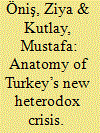

|
|
|
|
|
| Summary/Abstract |
A decade after the global financial turmoil, a new wave of crises is haunting the global South. This pattern is different from previous crisis episodes. Powerful shifts in the international order provide new policy space for emerging powers to manage their economic problems in a heterodox fashion. Key Western-led institutions no longer enjoy a monopoly in dictating the terms of financial assistance for countries in economic difficulty, as non-Western powers increasingly challenge the orthodox Washington Consensus paradigm. The present paper attempts to locate Turkey’s ongoing economic crisis in a comparative-historical context. Its central argument posits that the current crisis is the reflection of a fragile and unconsolidated presidential system and its associated mode of economic governance with state capitalist features. Turkey’s heterodox crisis allows us to draw attention to the complex interplay of global power transitions in a post-liberal international order and domestic political constellations during an era of growing authoritarian populism, generating a new equilibrium with rather unique features.
|
|
|
|
|
|
|
|
|
|
|
|
|
|
|
|
| 2 |
ID:
153240
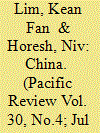

|
|
|
|
|
| Summary/Abstract |
The political-economic evolution of post-Mao China has been portrayed as a historically inevitable embrace of neoliberalism; as an exemplification of the East Asian developmental state and as an extension of Soviet New Economic Policy-style state capitalism. This paper evaluates these portrayals through a broad historical and geographical framework. It examines the position of China as a new state after 1949. It then places the shifting logics of socioeconomic regulation in China in relation to (1) the global neoliberal hegemony since the 1980s and (2) the concomitant shifts in the economic policies of Japan, South Korea and Taiwan. In so doing, the paper demonstrates how the Communist Party of China creatively adapted and re-purposed regulatory logics from the Washington Consensus and East Asian policies to consolidate its own version of Leninist state-led development.
|
|
|
|
|
|
|
|
|
|
|
|
|
|
|
|
| 3 |
ID:
195561


|
|
|
|
|
| Publication |
New Delhi, Pentagon Press, 2021.
|
| Description |
xviii, 360p.: tables, figures, mapshbk
|
| Standard Number |
9789390095353
|
|
|
|
|
|
|
|
|
|
|
|
Copies: C:1/I:0,R:0,Q:0
Circulation
| Accession# | Call# | Current Location | Status | Policy | Location |
| 060605 | 338.9/YEL 060605 | Main | On Shelf | General | |
|
|
|
|
| 4 |
ID:
193208
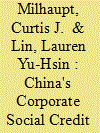

|
|
|
|
|
| Summary/Abstract |
Chinese state capitalism may be transitioning towards a technology-assisted variant that we call “surveillance state capitalism.” The mechanism driving this development is China's corporate social credit system (CSCS) – a data-driven project to evaluate the “trustworthiness” of all business entities in the country. In this paper, we provide the first empirical analysis of CSCS scores in Zhejiang province, as the Zhejiang provincial government is to date the only local government to publish the scores of locally registered firms. We find that while the CSCS is ostensibly a means of measuring legal compliance, politically connected firms receive higher scores. This result is driven by a “social responsibility” category in the scoring system that valorizes awards from the government and contributions to causes sanctioned by the Chinese Communist Party. Our analysis underscores the potential of the CSCS to nudge corporate fealty to party-state policy and provides an early window into the far-reaching potential implications of the CSCS.
|
|
|
|
|
|
|
|
|
|
|
|
|
|
|
|
| 5 |
ID:
194986


|
|
|
|
|
| Summary/Abstract |
By introducing the Belt and Road Initiative (BRI), an international infrastructure investment strategy, China attracted a lot of attention. China's approach to state capitalism has opened a window of opportunity for other infrastructure investment strategies. In response, the world's largest and liberally minded economies, such as the United States of America, Japan, and the European Union, have focused on connectivity and embarked on similar strategies. In this article, I conduct a comparative analysis of infrastructure investment strategies. I analyze key tenets of the BRI and international responses through the prism of principles, priorities, funding, financing, governance, and implementation. The comparison of strategies highlights more commonalities than differences, and I identify several instances in which liberal economies act in contradiction to their variety of capitalism. The results suggest that China has opened a window of opportunity for proactive infrastructure investment strategies, and major economies have responded in kind. With overlapping emphases in similar geographic regions, these strategies lead to competition. Consequently, recipient countries profit from an advantageous negotiating position when seeking to attract foreign direct investment in infrastructure projects.
|
|
|
|
|
|
|
|
|
|
|
|
|
|
|
|
| 6 |
ID:
181837
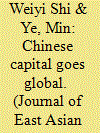

|
|
|
|
|
| Summary/Abstract |
The Belt and Road Initiative (BRI), and China's state-led model for economic globalization more generally, have attracted controversy: Are state-led overseas investment and lending driven by strategic motives or market rationale? How have the recipient economies reacted to the influx of Chinese capital? This special issue sheds light on these questions by first outlining the fragmented state system driving the BRI, a system featuring both Beijing's strategic logic at the top and market considerations in policy implementation. The role of the state is unpacked further in China's globalizing coal industry and in the growth of Chinese industry export to BRI countries. Finally, the issue explores the mechanisms behind public backlash and political pushback facing China in Zambia and Australia. As the COVID-19 pandemic continues to shift China's relationship with the world, this special issue contributes to a more nuanced understanding of the modus operandi of Chinese capital going global.
|
|
|
|
|
|
|
|
|
|
|
|
|
|
|
|
| 7 |
ID:
049926
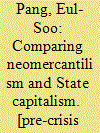

|
|
|
|
|
| Publication |
Malaysia, Strategic and Security Studies Unit (UPSK), 2000.
|
| Description |
26p.
|
| Series |
UPSK Occasional Paper 6/00
|
| Standard Number |
9832237068
|
|
|
|
|
|
|
|
|
|
|
|
Copies: C:1/I:0,R:0,Q:0
Circulation
| Accession# | Call# | Current Location | Status | Policy | Location |
| 044987 | 330.122/PAN 044987 | Main | On Shelf | General | |
|
|
|
|
| 8 |
ID:
167062
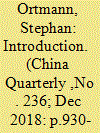

|
|
|
|
|
| Summary/Abstract |
This special section deals with China's longstanding fascination with Singapore's development experience that has preoccupied post-Maoist leaders from Deng Xiaoping to Xi Jinping despite the obvious differences between the tiny Southeast Asian city-state and the most populous country on earth. In particular, there is great Chinese interest in Singapore's success in combining effective governance and efficient state capitalism with stable one-party dominant rule. As a consequence, Chinese observers paid much less attention to electoral democracies that were well-governed states with mature economies.
|
|
|
|
|
|
|
|
|
|
|
|
|
|
|
|
| 9 |
ID:
138152
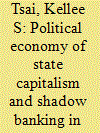

|
|
|
|
|
| Summary/Abstract |
The Xi-Li administration faces the dual challenge of managing state capitalism and shadow banking as China enters a phase of more moderate economic growth. During China’s first three decades of reform, private sector development occurred in parallel with prioritization of state-owned enterprises in strategic industries, and growth surged. This pattern of state capitalism rested on an unarticulated bifurcated financing arrangement whereby the formal banking system primarily served public enterprises, while private businesses relied primarily on informal finance. However, China’s response to global financial crisis disrupted the preceding equilibrium of financial dualism under state capitalism. Unprecedented expansion of bank lending after 2008 created opportunities for a host of state economic actors—including SOEs, state banks, and local governments—to expand their participation in off-balance sheet activities.
|
|
|
|
|
|
|
|
|
|
|
|
|
|
|
|
| 10 |
ID:
171319
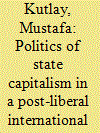

|
|
|
|
|
| Summary/Abstract |
This article discusses the transformation of the liberal international order, with reference to the ways in which global shifts affect the developmental paradigms among the emerging middle powers. Although it is rarely contested that the liberal order is being severely tested, the dynamics and potential consequences of this transformation are a matter of intense controversy. Also, the debate mainly focuses on great power politics, without paying adequate attention to the ways in which middle powers are influenced by and inform the transition to a post-liberal international order. By focusing on the case of Turkey, this article addresses whether non-Western great powers (Russia and China in particular) are leading the emergence of alternative order(s), and if so, through what mechanisms. Based on the reciprocal interactions between ideas, material capabilities and institutions, I argue that the preferences of the Turkish ruling elite seem to be gradually shifting from a Western-oriented liberal model towards a variety of ‘state capitalism’ as an alternative developmental paradigm in a post-liberal international order.
|
|
|
|
|
|
|
|
|
|
|
|
|
|
|
|
| 11 |
ID:
127603
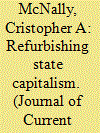

|
|
|
|
|
| Publication |
2013.
|
| Summary/Abstract |
This article provides an analysis of policy initiatives aimed at rebalancing China's political economy, especially those contained in the 12th Five Year Plan and other recent pronouncements. The objective is to generate a conceptual examination of these policy measures, thereby highlighting their basic intent and purpose. The analysis shows that the Chinese leadership intends to pursue policies that can centralize, standardize and regulate the political economy under continued state guidance. Due to the considerable political obstacles that Chinese policy-makers face in rebalancing the political economy, a more state-centric approach is seen as necessary. China is therefore pursuing a policy package of refurbishing state capitalism. While a degree of liberalization is likely to be undertaken, the major thrust is one of revamping, restructuring and, ultimately, strengthening state control and guidance over the political economy.
|
|
|
|
|
|
|
|
|
|
|
|
|
|
|
|
| 12 |
ID:
163233
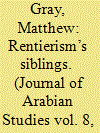

|
|
|
|
|
| Summary/Abstract |
his paper examines rentier state theory (RST), and specifically “rentierism” as a more refined and nuanced variant of RST, arguing that while rentierism provides considerable utility in explaining the state-society relationships of the contemporary Arab states of the Persian Gulf, it is insufficient as a stand-alone explanation, and needs to be considered as a political dynamic of the state-society relationship, rather than as a structural explanation for the state itself, as early RST more ambitiously sought to do. Rentierism therefore needs to be utilized in combination with two other explanatory frameworks, neopatrimonialism and state capitalism. In effect, these are rentierism’s theoretical “siblings”: they sharpen a rentier analysis by providing greater nuance about how elite networks, business-government relations, and personalized politics operate and interact in the allocative settings of the Gulf, as well as illustrating both the scope and the limits of rentierism as an explanatory framework.
|
|
|
|
|
|
|
|
|
|
|
|
|
|
|
|
| 13 |
ID:
172131


|
|
|
|
|
| Summary/Abstract |
State activism is strengthening in the Indonesian economy. One major aspect of this recent strengthening is the government’s mobilisation of public entities to provide patient capital for development projects. Joko Widodo’s government (2014–2019) has injected a significant amount of capital into these development ‘financiers’ across diverse sectors. This strategy has served as the government’s response to the shrinking external development finance, the underdeveloped domestic capital market, and the limitations of Indonesia’s former development model. Along with a notable expansion in the size of development financiers, significant transformation of missions, targets, and policy tools has occurred over a short time span. More precisely, Indonesia’s major development financiers have begun to focus on accelerating strategic infrastructure development and industrialisation and supporting state enterprises in related areas. On top of dealing with immediate development challenges, the growth and transformation of development financiers have also had an effect of expanding the government’s policy space. The Indonesian government now has a greater capacity to autonomously mobilise public capital to fund development projects.
|
|
|
|
|
|
|
|
|
|
|
|
|
|
|
|
| 14 |
ID:
089224
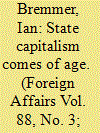

|
|
|
|
|
| Publication |
2009.
|
| Summary/Abstract |
Across the United States, Europe, and much of the rest of the developed world, the recent wave of state interventionism is meant to lessen the pain of the current global recession and restore ailing economies to health. For the most part, the governments of developed countries do not intend to manage these economies indefinitely. However, an opposing intention lies behind similar interventions in the developing world: there the state's heavy hand in the economy is signaling a strategic rejection of free-market doctrine.
|
|
|
|
|
|
|
|
|
|
|
|
|
|
|
|
| 15 |
ID:
146646
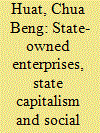

|
|
|
|
|
| Summary/Abstract |
State-owned enterprises and sovereign wealth funds have ‘insured’ Singapore's domestic economy against financial crisis and restructuring interventions from multilateral institutions, engendered elite cohesion and political stability, binding middle class employees to the political system. This essay analyses paths by which the Singapore government established state-owned enterprises and transformed them into global enterprises. It also examines how sovereign wealth funds contribute to government social expenditure without increasing taxes. Such redistribution through state capitalism resonates with the People's Action Partys social democratic origins, inviting comparisons with contemporary developments in Chinese state-capitalism.
|
|
|
|
|
|
|
|
|
|
|
|
|
|
|
|
| 16 |
ID:
190689
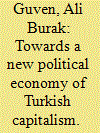

|
|
|
|
|
| Summary/Abstract |
Political economists investigating Turkey's turbulent path in recent years predominantly work from within three different characterizations of Turkish capitalism: authoritarian neoliberalism, crony capitalism, and state capitalism. This article critically reviews these competing visions and identifies directions for future research. I argue that, fundamental differences aside, these approaches together illustrate the indispensability of a political economy perspective for comprehending Turkey’s current predicament, in particular its authoritarian turn and ongoing systemic crisis. Yet meeting the potential of this research program also requires resisting rigid macro conceptualizations and aiming instead for empirically rich analyses of nuts-and-bolts phenomena such as changes in the class map, sectoral regimes, and challenges of development, with a view to identifying feasible strategies of renewal post-AKP.
|
|
|
|
|
|
|
|
|
|
|
|
|
|
|
|
| 17 |
ID:
148275


|
|
|
|
|
| Summary/Abstract |
This article examines how Koreans became industrial workers in the first and second phases of industrialisation on the peninsula: under Japanese colonial rule, 1931–45 and under the DPRK’s post-Korean War heavy industrialisation, 1953–60. While the political regimes of the Japanese colony and postcolonial DPRK were different, industrialisation occurred under similar conditions, characterised principally by war, state capitalism and imperialism. Processes of proletarianisation also reveal similarities in the two periods, including the widespread use of forced mobilisation and immobilisation of workers, and a bureaucratic apparatus supporting close control of labour. The article contributes to the critique of conventional views about the role of ‘free wage labour’ during the transition to capitalism.
|
|
|
|
|
|
|
|
|
|
|
|
|
|
|
|
|
|
|
|
|